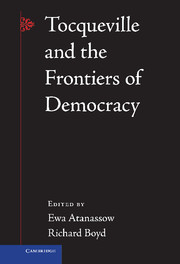Book contents
- Frontmatter
- Contents
- List of Contributors
- Short Title Abbreviations of Tocqueville's Major Works
- Acknowledgments
- Introduction: Tocqueville and the Frontiers of Democracy
- Part One The Meaning of Democracy and the Democratic Revolution
- Part Two Democratization in a Non-Western Context
- Part Three Challenges of Globalization: Democracy, Markets, and Nationhood
- 7 Tocqueville and the Unsettled Global Village
- 8 Nationhood – Democracy's Final Frontier?
- 9 Commerce, Glory, and Empire: Montesquieu's Legacy
- Part Four Democracy, Imperialism, and Foreign Policy
- Part Five Democracy's Old and New Frontiers
- Epilogue: New Frontiers, Old Dilemmas
- Bibliography of Works Cited
- Index
- References
7 - Tocqueville and the Unsettled Global Village
Published online by Cambridge University Press: 05 April 2013
- Frontmatter
- Contents
- List of Contributors
- Short Title Abbreviations of Tocqueville's Major Works
- Acknowledgments
- Introduction: Tocqueville and the Frontiers of Democracy
- Part One The Meaning of Democracy and the Democratic Revolution
- Part Two Democratization in a Non-Western Context
- Part Three Challenges of Globalization: Democracy, Markets, and Nationhood
- 7 Tocqueville and the Unsettled Global Village
- 8 Nationhood – Democracy's Final Frontier?
- 9 Commerce, Glory, and Empire: Montesquieu's Legacy
- Part Four Democracy, Imperialism, and Foreign Policy
- Part Five Democracy's Old and New Frontiers
- Epilogue: New Frontiers, Old Dilemmas
- Bibliography of Works Cited
- Index
- References
Summary
This is no outer dark
But a small province haunted by the good,
Where something may be understood
And where, within the sun's coronal arc,
We keep our proper range,
Aspiring, with this lesser globe of sight,
To gather tokens of the light…
– Richard Wilbur
Alexis de Tocqueville worked well within boundaries, particularly within the boundaries of the nation-state. In most of his writing, he grounds his theoretical claims in the analysis of a particular country: England, France, the United States. Yet even as his writing seems to rely on the existence of borders between states in that way, in other ways Tocqueville draws attention to the impermanence and even impotence of political borders in the modern world. He says he bears witness to a time in which “the barriers that separate nations within humanity and citizens within the interior of each people tend to disappear.” The “frightening spectacle” that Tocqueville professes to behold in Democracy in America is in large part the spectacle of a world where long-standing political borders, especially at the international level, are being crossed and compromised at a furious rate. Democratization seems to him the great political development of the modern age in part because it transcends and often obliterates what have long seemed to be the settled political markers and lines of the globe.
- Type
- Chapter
- Information
- Tocqueville and the Frontiers of Democracy , pp. 153 - 177Publisher: Cambridge University PressPrint publication year: 2013



